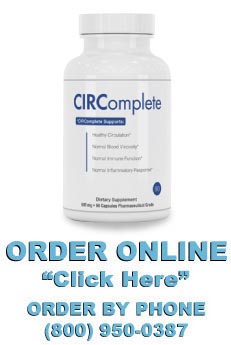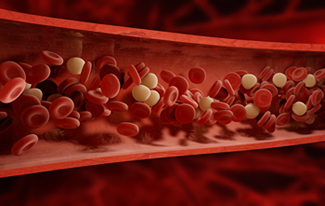Fibrin Defense
Fibrin is a protein formed in the human body responsible for scar tissue and thrombus formation. CIRComplete contains a blend of fibrinolytic (fibrin degrading) enzymes that specifically address fibrin levels in the body. Our bodies normally secrete sufficient levels of plasmin, an important enzyme present in the blood that degrades many blood plasma proteins and blood clots. Plasmin, our own natural blood thinner, is responsible for maintaining normal blood solvency by removing unnecessary accumulated protein. The normal process of removing excessive fibrin can be enhanced by introducing fibrinolytic enzymes like those found in CIRComplete.
Fibrinogen Over-Production
Hyper-coagulation & Fibrin Defense
 Enzymes can be thought of as proteins on a mission. And when it comes to improving your health, one of the most potent targets an enzyme can seek and destroy is a fibrous protein called fibrin. CIRComplete contains a powerful combination of fibrin-dissolving enzymes like serrapeptase, nattokinase and bromelain, as well as other natural ingredients. That is why it is known as CIRComplete – Fibrin Defense. But to understand why the body needs help defending itself against fibrin you first need to understand a bit more about the protein itself.
Enzymes can be thought of as proteins on a mission. And when it comes to improving your health, one of the most potent targets an enzyme can seek and destroy is a fibrous protein called fibrin. CIRComplete contains a powerful combination of fibrin-dissolving enzymes like serrapeptase, nattokinase and bromelain, as well as other natural ingredients. That is why it is known as CIRComplete – Fibrin Defense. But to understand why the body needs help defending itself against fibrin you first need to understand a bit more about the protein itself.

Fibrin
 Fibrin is an insoluble protein that plays a major role in the formation of blood clots and scar tissue. During the blood clotting process, the soluble protein fibrinogen converts into insoluble fibrin, which is then laid down inside the damaged blood vessel. The fibrin strands then assemble into a net-like gel that hardens and captures all of the materials necessary to patch the damaged vessel. This is the structural framework of a blood clot. Obviously, fibrin plays a vital role in the healing process; however, when there is fibrin overproduction, it can lead to the formation of dangerous and unnecessary blood clots in the body [1]. One factor that can lead to excessive fibrin is ageing.
Fibrin is an insoluble protein that plays a major role in the formation of blood clots and scar tissue. During the blood clotting process, the soluble protein fibrinogen converts into insoluble fibrin, which is then laid down inside the damaged blood vessel. The fibrin strands then assemble into a net-like gel that hardens and captures all of the materials necessary to patch the damaged vessel. This is the structural framework of a blood clot. Obviously, fibrin plays a vital role in the healing process; however, when there is fibrin overproduction, it can lead to the formation of dangerous and unnecessary blood clots in the body [1]. One factor that can lead to excessive fibrin is ageing.
As we age, the concentration of fibrinogen increases in our blood [2]. High levels of fibrinogen increases fibrin production, and as fibrin begins to accumulate in the blood vessels it generally leads to the formation of blood clots [3]. Healthy individuals usually have sufficient levels of plasmin, an enzyme that breaks up fibrin blood clots. Unfortunately plasmin production slows down as we get older so the normal process of removing excess fibrin is reduced. The result of this can be cardiovascular disease, heart attacks, strokes, pulmonary emboli, deep vein thrombosis (DVT) and other related disorders [4-8].
